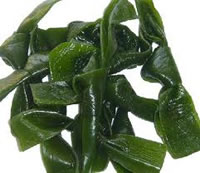
While putting together this week’s mots de la semaine, some of the interesting words and phrases that come in the French conversation group I go to on Thursday evenings, I discovered the Welsh word gwymona [gʊɨˈmɔna], which means “to gather seaweed (for fertilizer)” – an interesting and specific meaning.
It comes from the word for seaweed, gwymon and suggests that seaweed and the gathering of it was sufficiently important in Wales for there to be a verb for it.
Are there a similar verbs in other languages?
A type of seaweed known as laver (porphyra umbilicalis) is sometimes eaten in Wales as a cold salad with lamb or mutton; heated and served with boiled bacon; or eaten in the form of laverbread (bara lawr), which is made from laver that is boiled for several hours, then minced or pureed, mixed with oatmeal and fried. Traditionally laverbread was eaten for breakfast with cockles and bacon.
Laver is far more commonly eaten in East Asia, especially in Japan, where it is known as 海苔 (nori), in Korea, where it’s called 김 (gim), and in China, where it’s known as 紫菜 (zǐcài).
We have a few words of that kind in English, e.g. bilberrying, mushrooming, nutting
Latvian has verbs formed in a similar way: ogot – to gather berries (ogas – berries), sēnot – to gather mushrooms (sēnes – mushrooms), riekstot – to gather nuts (rieksti – nuts). Whilst I was in Latvia, however, I more often heard the word ‘lasīt (ogas, sēnes, riekstus etc.)’ for ‘gather’ – incidentally, the same word used for ‘to read’.
Like in English, the specialised verbs are not generally conjugated, but used with an auxiliary (e.g. “She went mushrooming,” not “She mushroomed” – “Viņa aizgāja sēnot”)
The Welsh equivalent of your bilberrying, mushrooming and nutting would be:
Bbilberries: llus > llusa – casglu llus, gather bilberries/whinberries
Mushrooms: madarch > madarcha – casglu madarch, gather mushrooms
Nut: cneuen > cneua – casglu cnau – gather nuts
@Yenlit – Are these verbs commonly used self standing – e.g. mi fadarchodd hi, mi fadarcha i – or are they more likely to be used in conjunction with mynd – e.g. mi aeth hi fadarcha?
Yes, they’re used self standing and the more common words like ‘siopa’ do appear with ‘mynd’ etc. dw i’n mynd i siopa efo fy ffrindiau.
cwch pysgota fishing boat
llynges bysgota fishing fleet
llinyn pysgota fishing line
lein bysgota fishing line
Another type of esible seaweed, known as dulse, is eaten in Canada’s maritime provinces and often sold dried in natural foods stores as an alternative to potato chips (i.e. crisps in British English). The French word? goémon.
*edible.
I still have not mastered the art of typing error-free on my iPad. (Without the constantly intrusive and famously error-inducing autocorrect feature, that is.)
@David – Sorry, I misread what you said, when you said ‘stand alone’ I thought you meant used as we would use an adjective or gerund in English like the examples:
cwch pysgota fishing boat
llynges bysgota fishing fleet
llinyn pysgota fishing line
lein bysgota fishing line
Many verbs in -ta, e.g. pysgota, cardota (to beg), mercheta (to womanise) have no conjugated, inflected forms at all eg. ‘pysgota’ like ‘byw’, ‘marw’ etc. at least in the literary language but may be found in the spoken language.
@Christopher: goémon looks suspiciously Breton (goumon) & Cornish: seaweed gommon
The Cornish version of Welsh ‘gwymona’ would be:
gather apples avalowa
gather berries mora
gather corn tyska
gather flowers terri
gather mussels meskla
gather nuts knowa
gather seaweed gomonna
Fishing, even (at the risk of pointing out too obvious an example!)
In Breton, there is the word “gouemon” (http://www.agencebretagnepresse.com/cgi-bin/dico.cgi?dico=breton&key=gouemon) which is some kind of seaweed.
And in Breton, we can add the ending “a” to create a verb meaning to go and collect, I I guess “gouemona” in Breton is a correct word which means “to go and collect seaweed”.
It sounds fairly similar to Welsh.
The Breton word “gouemon” is one of the few words that was imported in French (“Goémon” in French). I remember seeing many boats that collect “gouémon” in Brittany. Those boats are called “gouémonier” (http://fr.wikipedia.org/wiki/Go%C3%A9monier).